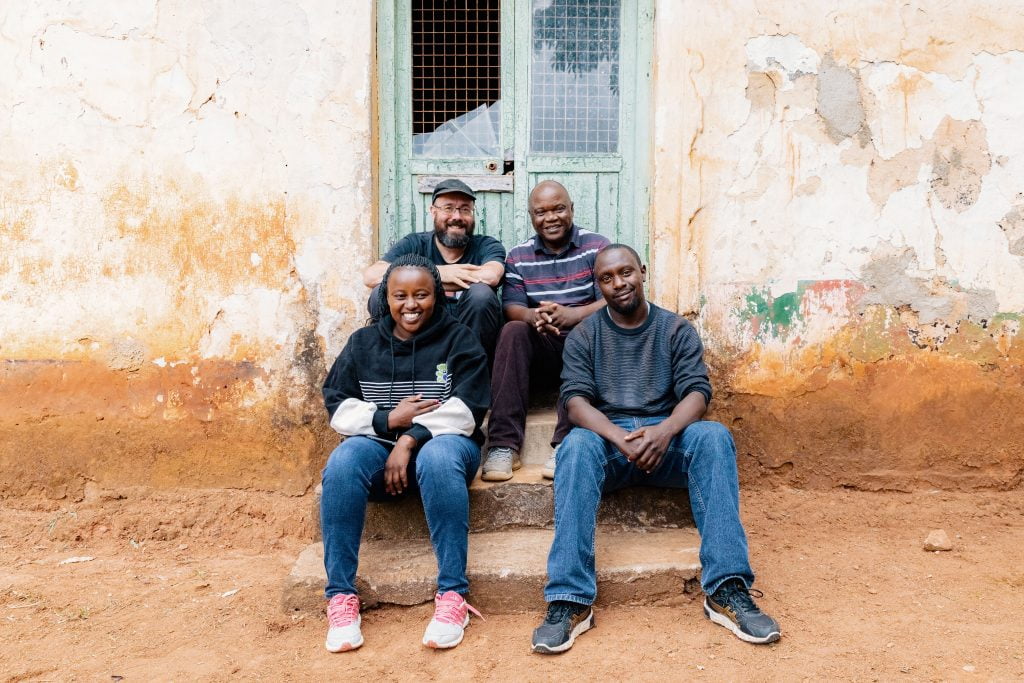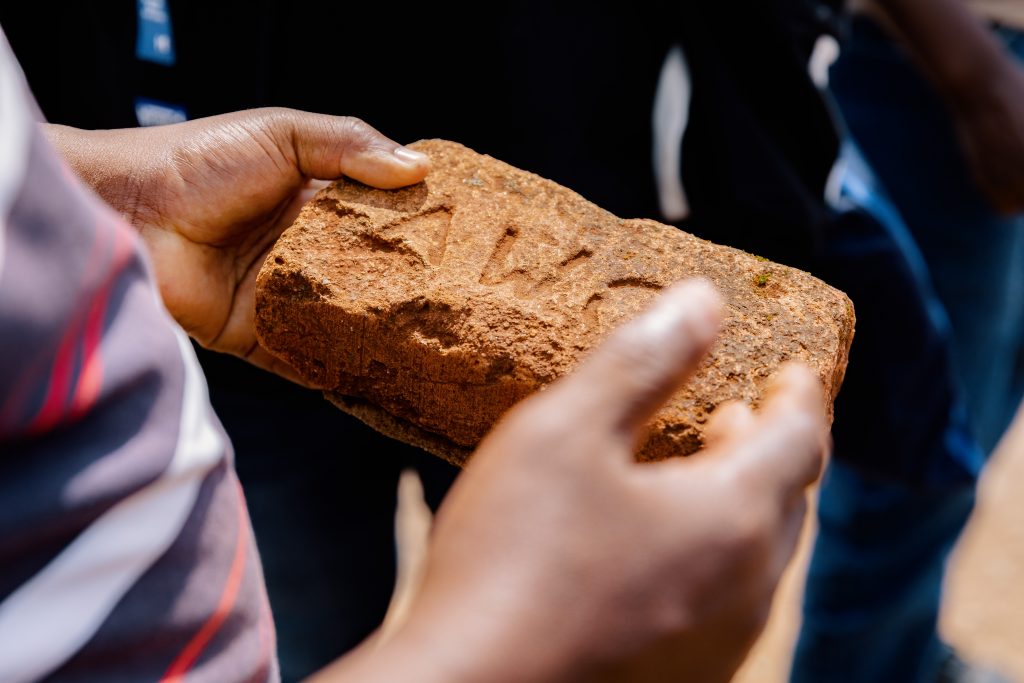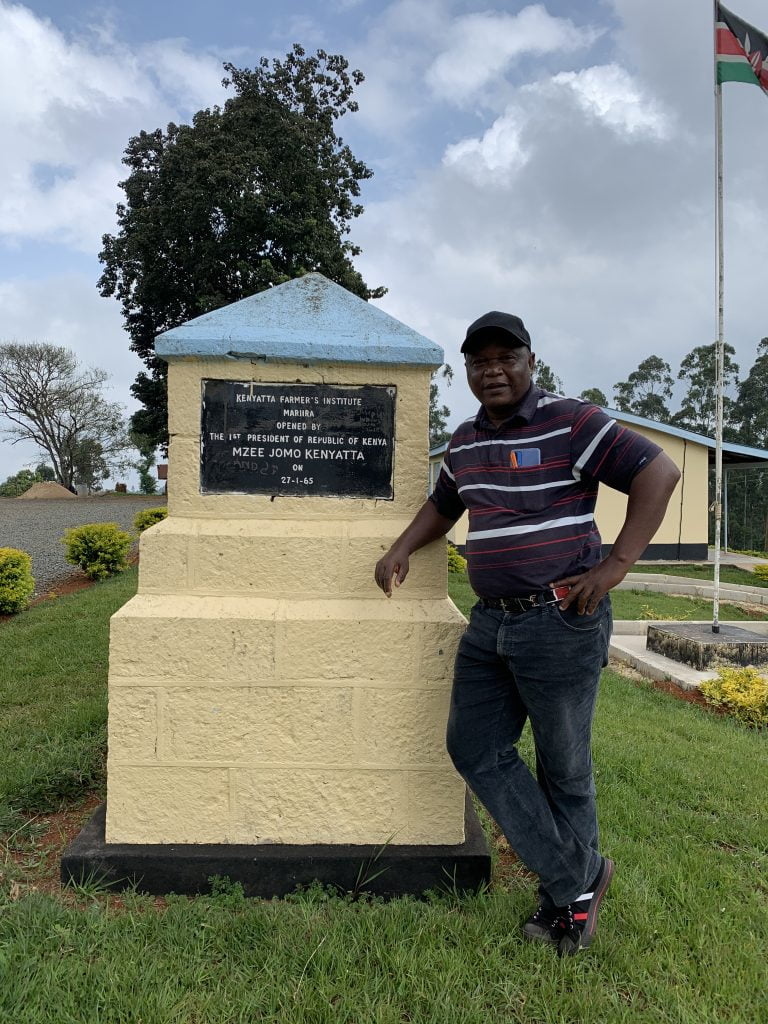What would MBC be without Anthony Maina? Over many years Anthony has acquired a wealth of knowledge about Mau Mau history which he has generously shared with MBC and other researchers. In August 2023 we sat down with Anthony outside his office at the historic Fort Hall to talk about the roots of his fascination with history, his work with veterans and survivors of the conflict, and his hopes for the future of Mau Mau heritage in Kenya.
Interview by Gabe Moshenska, Henry Ngugi Ikiyu, Caroline Wanjiru Wambui, and Solomon Nzioki Kyalo. Text edited for clarity.
I started taking an interest in history some years back when I was in primary school. I learned the history of the country, but not the one of the Mau Mau. One morning I was walking to school and it started raining, I was taking shelter below a tree and a man gave me a lift. It was a white man, I didn’t know who he was. Later on I realised that he was Dr Richard Leakey, the former director of the National Museum of Kenya. We became friends.
I wished that one day I would work at National Museums of Kenya. Luckily, even without Leakey’s knowledge, in 1988 I joined the National Museums as a security guard. First I started as a casual groundsman, then as a casual guard, from there I was given the permanent position of a security guard. Later I was promoted to senior security guard, then security supervisor. Then in the year 2008 I was transferred to Nyeri, which was very new to me, to start a museum there. I had not requested for a transfer, in fact I was very comfortable as a security worker. I think the management just decided to test me and they proved me right!

When I went to Nyeri I found that we had already restored a building for the museum, so the first thing was to collect the history of the area. One of the first histories that I collected was of the courts which judged the Mau Mau. The other thing I did was to give the war veterans an office, just within the museum compound. After that I collected a lot of information about the history of the Mau Mau from those elders, and I took a lot of interest. By then the Mau Mau had taken the British to the courts in England, and so I had a lot of interviews with the elders, and that is when I started to take a lot of interest in the history. I saw that a lot of history has been kept here without our knowledge, and that’s how I started taking an interest in the Mau Mau history.
Working with veterans is wonderful. Wonderful, wonderful. I have learned a lot about the history of this country, the liberation struggle of this country, what they went through, the hardships they faced. I have encountered those who were in the forest, those in the colonial villages, and those in the detention camps. I have been able to interview them, to ask them questions.
For example I asked an elder, a veteran of the forest, how did they preserve meat when they had taken a cow from a settler? And he told me in the Abedares they have bamboo, and bamboo grows in very cold environments, so they pulled the bamboo down and fixed the meat so it springs back up again, because if you put it on the ground hyenas will take it away. For those in colonial villages, they told me how they used to be woken up at five o’clock in the morning to go to communal work, forced labour. They told me about women being raped in those camps, and all these things.
In the detention camps, that’s where I think they faced a lot of hardship. For example there is a camp in Mareira called Mareira Works Camp, here in Muranga County, where I was told that you would dig a pit six feet, and you were buried up to the neck, where you would stay up to ten hours, as a kind of punishment. In a camp like Aguthi Works Camp, you could be told to dig the same pit, and then be shot inside and be buried. In a camp like Manyani there was a kind of cattle dip, where you are put in with your full clothes and belongings, and if you don’t get wet up to the head somebody with a stick will beat you up. All of those things I have not read from a book, but from oral history interviews with those veterans.
The first artefacts I collected for Nyeri Museum were bricks, and the reason I took an interest – I saw them stamped AWC, and I did not know what AWC means, until I encountered a certain veteran who told me ‘oh, this was a place I was detained, it was called Aguthi Works Camp’. And I asked him what is it now, and he told me it is the present Kangubiri Girls School. And I took a lot of interest and I went there, and that’s where I got some of the artefacts which are in Nyeri Musuem.

In Kenya we need to preserve the remaining monuments as part of our history. Not much has been done. They need gazetting, and they need to move with speed. For example if you go to the school at Kangubiri with a lot of history, or Mweru with a lot of history, Mareira with a lot of history, those buildings are at the mercy of those institutions. They can just demolish them. But personally I have been working very closely with those institutions and I made them understand. But I am still waiting for the gazetting.
I would do wonders if the government or donors gave finances for the restoration of those monuments, including the caves at Mount Kenya and Kariba. These are monuments that need to be preserved. If the museum could get donations for the preservation of such sites, I know the museum could do wonders. If I could speak to the President of the Republic of Kenya, one on one, I just tell him in one sentence: give more money to the Ministry of Heritage, Tourism and Culture.
Then the mass graves. That makes me a sad man. When I visit British war graves in Kenya they have got well preserved cemeteries. It is like a park, where you can walk. Come to our freedom fighters, here you will be surprised. You cannot even recognise the grave because some have been turned into slums. For example if you visit Nyeri town, the National Museum gazetted a five acre plot which was a mass grave for people who were hanged, near Nyeri golf club. The place has been invaded by squatters.
In a hundred years history would judge us harshly if, for the future generation, we don’t document and preserve this history in modern digital forms and in written books. That’s the only way we can preserve the history. Because what I can foresee is that within the next ten years I don’t think we shall have those veterans alive. They are very old now, and some are even senile, they have lost their memories.

I call myself a man of the people. I have never ignored anybody, from the biggest to the smallest person. If you come to my office here, whether you are from the village, whether you are from the office, I just welcome you. The other thing is I do like doing a lot of studies, learning about the history, that is my passion. So whenever someone comes here and tells me maybe there is a building here, or a monument there, or a building or a cave that was used by the Mau Mau, I take a lot of interest, to go and see what was happening there. I have a lot of contacts with the people, it is only time I don’t have! I like to have a lot to do.
And also it’s from the blood, my passion. The people I talk to are very free with me, they call me their son. They give me a lot of history, and that’s how I keep on moving. Already I have written about three exercise books of notes. But most of the history I have it in my head.
I know the Mau Mau history will not be lost. And personally, I am very eager to share it, with whoever would like to learn much more about history. You can come. He or she can come. I don’t want to die with that history! Let me give it to the people.